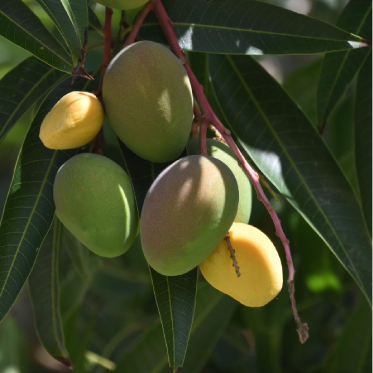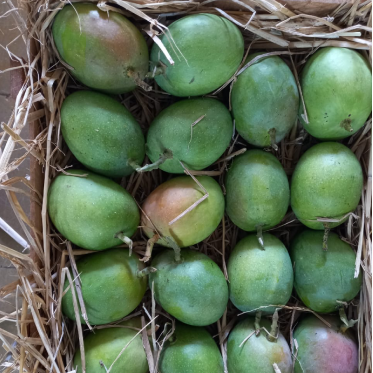Alphonso Ratnagiri Alphonso Identifying authentic and chemical-free mangoes is important to ensure you get high quality and authentic fruits. Many minerals on the market treat Alphonso mangoes with chemicals such as calcium carbide or ethylene gas to artificially ripen them. Here are some tips you can use to tell the difference between naturally ripe Alphonso Ratnagiri Alphonso Mangoes and artificial ones:
Check Skin Color and Texture:
- Natural Juice:
Alphonso Ratnagiri Real Alphonso mangoes are golden yellow or saffrron in color, with a hint of green on the trunk. The color may not be uniform, as ripe Ratnagiri Alphonso mangoes naturally tend to have slight variations in shade. - Chemical Ripening: If the Ratnagiri Alphonso Mangoes have an excessively vibrant, uniform yellow coloration and not using a version or inexperienced patches, they’ll had been chemically ripened. The pores and skin might also appear unnaturally shiny.
Smell:
- Natural Ratnagiri Alphonso Mangoes: Authentic Alphonso Ratnagiri Alphonso Mangoes have a awesome, sweet, fruity aroma. This is one of the maximum dependable indicators of a evidently ripened Ratnagiri Alphonso Mango.
- Chemically Ripened Ratnagiri Alphonso Mangoes: Ratnagiri Alphonso Mangoes ripened with chemical substances like calcium carbide frequently lack a strong, herbal smell. If the Ratnagiri Alphonso Mango has little to no perfume, it might had been artificially ripened.
Touch and Firmness:
- Natural Ripening: Naturally ripened Alphonso Ratnagiri Alphonso Mangoes are tender to the touch however not delicate. Press them lightly—if the fruit yields slightly, it’s ripe. However, the fruit will still have a company consistency in certain regions.
- Chemical Ripening: Ratnagiri Alphonso Mangoes ripened with chemicals may also feel unnaturally tender or smooth in some spots and tough in others. The texture may additionally experience rubbery.
Look for wrinkles near the tree:
- Natural ripening: Alfonso Ratnagiri Naturally ripe Alfonso mangoes tend to have a slight wrinkle on the stem, indicating that the fruit is slowly ripening
- Ripeness: Ratnagiri Alphonso chemically treated mangoes have a smooth and flawless surface without any wrinkles.
Taste:
- Natural Ratnagiri Alphonso Mango: Naturally ripened Alphonso Ratnagiri Alfonso mangoes have a sweet, balanced and slightly tart flavor The flesh should be juicy and creamy.
- Ratnagiri Alphonso Fermented Mangoes: Ratnagiri Alphonso fermented mangoes tend to have an unpleasant taste, sometimes metallic or chalky and may not have enough natural sweetness and flavor.
Check the Inside Flesh:
- Natural Ripening: The flesh of an Alphonso Ratnagiri Alphonso Mango must be deep orange-yellow, easy, and free of white patches.
- Chemical Ripening: If you cut open the Ratnagiri Alphonso Mango and find white or green patches internal, or if the fruit is erratically colored, it’d were ripened artificially.
Buy from Reliable Sources:
- Direct from Farmers or Organic Markets: Purchase Alphonso Ratnagiri Alphonso Mangoes at once from farmers, reputed natural stores, or certified sellers. They are more likely to promote Ratnagiri Alphonso Mangoes which can be naturally ripened and unfastened from chemical compounds.
- Check for Certifications: Some sellers provide natural or licensed chemical-unfastened Ratnagiri Alphonso Mangoes. Look for labels like “GI Certified” or “Organic” to make sure authenticity and fine.
Water Test (Home Method):
- You can strive a simple water check at domestic. Drop the Ratnagiri Alphonso Mango in a bowl of water:
- Naturally ripened Ratnagiri Alphonso Mangoes will usually sink to the lowest, as they have got extra weight and moisture.
- Chemically ripened Ratnagiri Alphonso Mangoes may also waft due to their lighter, drier texture caused by chemical compounds.
Avoid Off-Season Ratnagiri Alphonso Mangoes:
- Ratnagiri Alphonso Mango Season: Alphonso Ratnagiri Alphonso Mangoes are normally to be had from March to June. If you discover Alphonso Ratnagiri Alphonso Mangoes out of season, they’ll had been artificially ripened or preserved the use of chemical compounds.
Ethylene-Ripened Ratnagiri Alphonso Mangoes:
- While ethylene is a natural ripening agent, it is also used artificially in controlled environments.
- Ratnagiri Alphonso Mangoes ripened with ethylene fuel are much less harmful than the ones dealt with with calcium carbide, but they may still lack the wealthy taste and aroma of obviously ripened fruit. If the Ratnagiri Alphonso Mango has no distinct fragrance or taste, it can had been ripened with ethylene fuel.
Summary of Key Indicators:
- Look for herbal variations in coloration (now not uniform yellow).
- Smell the Ratnagiri Alphonso Mango for its sweet aroma.
- Feel the texture—it must be gentle yet organization in some regions.
- Check for wrinkles close to the stem.
- Cut open the Ratnagiri Alphonso Mango—it have to have wealthy, orange flesh with out white patches.
- By following these hints, you may better become aware of real, chemical-free Alphonso Ratnagiri Alphonso Mangoes and enjoy their authentic taste.










